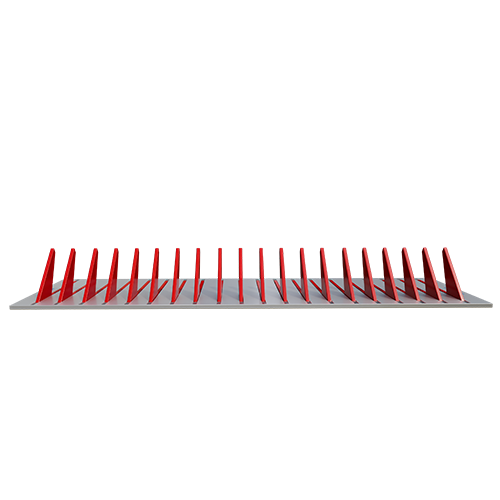FAQs
Frequently Asked Questions
Road tyre killers are commonly utilized in high-security environments such as military bases, government facilities, airports, and corporate offices. They are also effective in areas requiring strict vehicle control, including checkpoints, event venues, and parking lots. By preventing unauthorized vehicle access, these systems enhance security and protect sensitive locations from potential threats and intrusions.
Yes, automatic tyre killers can be seamlessly integrated with existing access control systems. This integration allows for coordinated operation, enabling the tyre killer to activate automatically when authorized vehicles approach. By working in conjunction with barriers, RFID systems, or keypad entry, automatic tyre killers enhance security measures while providing efficient access management in various high-security environments.
Road spike barriers are typically constructed from durable materials such as stainless steel, which offers corrosion resistance and strength. Some designs incorporate reinforced plastic or heavy-duty rubber for flexibility and impact absorption. The spikes themselves are often made from hardened steel to withstand significant force and puncture tires effectively, ensuring long-lasting performance in high-security applications and various environmental conditions
Spike tyre killers are designed for durability in extreme weather conditions. Constructed from high-quality, weather-resistant materials, they can withstand heavy rain, snow, and intense sunlight without compromising performance. The spikes are often coated to prevent rust and corrosion, ensuring they remain effective in various climates. This resilience makes spike tyre killers reliable security solutions for outdoor installations in diverse environments.
The operation of a hydraulic tyre killer is typically automatic. It uses hydraulic mechanisms to raise and lower the spikes efficiently, allowing for rapid deployment in response to approaching vehicles. This automatic functionality enhances security by providing a quick and reliable barrier against unauthorized access, making hydraulic tyre killers ideal for high-security areas that require immediate action.
Yes, manual tyre killers can be installed in areas with high vehicle traffic, although their effectiveness may vary compared to automated systems. These devices require human operation, which can slow response times during busy periods. However, when strategically placed and managed, manual tyre killers can still provide a robust security measure to deter unauthorized access in high-traffic environments.
Maintaining a portable tyre killer is generally straightforward due to its design and materials. Regular inspections for wear and tear are essential, along with cleaning the spikes to prevent debris buildup. Most portable models are constructed from durable materials, minimizing the need for extensive repairs. Additionally, their mobility allows for easy repositioning and storage, making maintenance efficient and manageable.
Yes, road spike barriers must adhere to specific certifications and compliance standards to ensure safety and effectiveness. These standards typically include local regulations for traffic control and security installations, as well as durability and performance testing. Compliance with industry standards, such as those set by the International Organization for Standardization (ISO), helps guarantee that road spike barriers are reliable and meet safety requirements.
Safety measures for tire killers include designing spikes that deploy only when unauthorized vehicles are detected, minimizing accidental punctures. Many systems feature warning signs to alert drivers before entry. Additionally, some tire killers incorporate safety sensors that prevent activation if a vehicle is moving too slowly or if an object is detected in their path, ensuring enhanced safety during operation.
The installation process for tyrebusters typically involves several steps. First, a site assessment is conducted to determine the optimal location. Then, necessary excavation is performed to prepare the ground. After installing the spikes and hydraulic or manual mechanisms, the Tyre Buster system is connected to power sources if applicable. Finally, thorough testing is conducted to ensure functionality and safety before finalizing the installation.
The lifespan of a spike road blocker under regular use can vary, typically lasting between 5 to 10 years. Factors influencing longevity include the quality of materials, frequency of use, and environmental conditions. Regular maintenance, such as inspections and cleaning, helps prolong its effectiveness. Proper installation and adherence to manufacturer guidelines also contribute significantly to the durability of the spike road blocker.
Most Tyre Killer systems require an electric power source to operate, especially automated models that use hydraulic or electronic mechanisms. They typically connect to standard AC power outlets, although some may offer battery backup options for continued operation during power outages. Manual systems, however, do not require any power source and operate independently.
Yes, there are several alternatives to Tyre Killers for vehicle access control, including bollards, gates, and barriers. Spike strips and vehicle immobilizers also serve similar purposes. Each option has its advantages and suitability depending on the specific security needs, traffic volume, and desired level of access control in a given area.
















